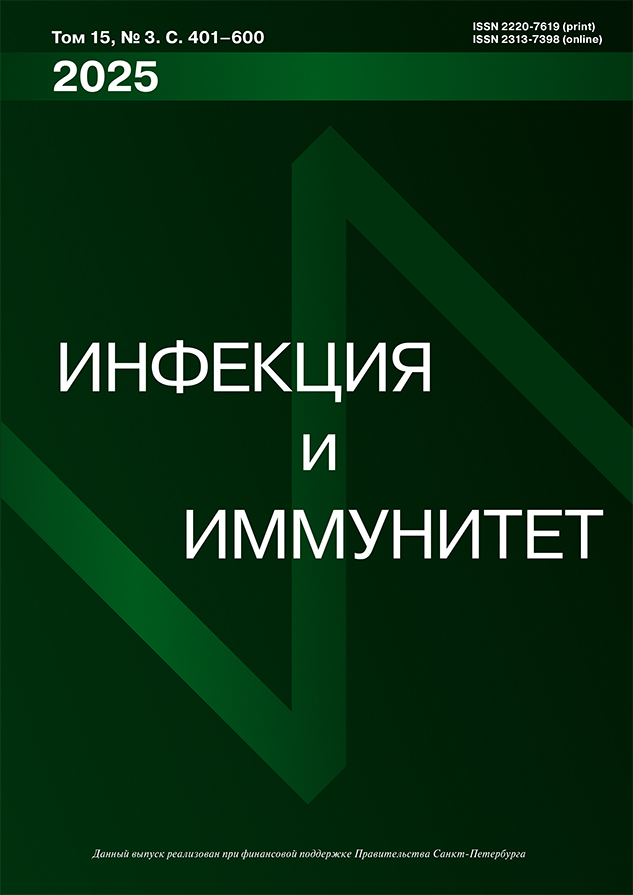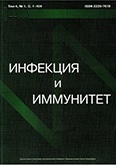ВЗАИМОДЕЙСТВИЯ ПАТОГЕННЫХ БАКТЕРИЙ С ВРОЖДЕННЫМИ ИММУННЫМИ РЕАКЦИЯМИ ХОЗЯИНА
- Авторы: Гариб Ф.Ю.1, Ризопулу А.П.1
-
Учреждения:
- ГОУ ДПО Российская медицинская академия последипломного образования, Москва
- Выпуск: Том 2, № 3 (2012)
- Страницы: 581-596
- Раздел: ЛЕКЦИИ
- Дата подачи: 02.07.2014
- Дата принятия к публикации: 02.07.2014
- Дата публикации: 02.07.2014
- URL: https://iimmun.ru/iimm/article/view/74
- DOI: https://doi.org/10.15789/2220-7619-2012-3-581-596
- ID: 74
Цитировать
Полный текст
Аннотация
Резюме. «Успешность» взаимодействия патогенов с системой иммунитета проявляется в широком распространении многих бактериальных инфекций, в первую очередь туберкулеза, а также в активизации известных и появлении новых возбудителей заболеваний. Эволюционно сформировались изощренные механизмы ускользания бактерий от распознавания; создания препятствий фагоцитозу и внутриклеточному киллингу; использования секреторных систем в виде «шприца» для введения в клетки хозяина дисрегулирующих веществ; подавления или усиления воспалительного ответа; активизации ингибирующих рецепторов для подавления респираторного взрыва в фагосоме; снижении синтеза провоспалительных цитокинов путем воздействия на инфламмасомы; стимуляции продукции цитокинов, супрессирующих врожденный ответ; повреждения ключевых молекул внутриклеточных сигнальных путей; манипуляции с апоптозом и аутофагией с целью выживания и репликации внутри клеток хозяина, блокирования процессинга и презентации бактериальных антигенов. Изучение механизмов взаимоотношений хозяин–паразит позволяет раскрыть новые факты, характеризующие «логику живых существ» на уровне патогенов и использовать их механизмы эвазии для решения актуальных проблем, стоящих перед человечеством, например, с целью создания оригинальных вакцин и принципиально новых лекарственных препаратов для коррекции нарушенных функций иммунной системы при многочисленных болезнях, таких как злокачественные новообразования, аутоиммунные и аллергические заболевания, а также инфекционные болезни, трудно поддающиеся профилактике и лечению. Кроме того, оказалось, что человечеству полезны постоянные взаимодействия с микроорганизмами, в том числе с патогенами, поскольку их продукты постоянно «тренируют» иммунную систему и содействуют ее эволюционному совершенствованию.
Ключевые слова
Об авторах
Ф. Ю. Гариб
ГОУ ДПО Российская медицинская академия последипломного образования, Москва
Автор, ответственный за переписку.
Email: fgarib@yandex.ru
д.м.н., профессор, профессор кафедры иммунологии
119421, Москва, ул. Обручева, 24-121
РоссияА. П. Ризопулу
ГОУ ДПО Российская медицинская академия последипломного образования, Москва
Email: fgarib@yandex.ru
Россия
Список литературы
- Хаитов Р.М. Иммунология: учебник. — М.: ГЭОТАР-Медиа, 2011. — 520 с.
- Ярилин А.А. Иммунология: учебник. — М.: ГЭОТАР-Медиа, 2010. — 752 с.
- Bacterial evasion of host immune responses / Еds. B. Hen derson, P.C.F. Oyston / Cambrige university press, 2003. — 304 p.
- Belkaud Y., Tarbell K. Regulatory T-cells in the control of host-microorganism interactions // Annu. Rev. Immunol. — 2009. — Vol. 27. — P. 551–589.
- Bowie A.G., Unterholzner L. Viral evasion and subversion of pattern-recognition receptor signalling // Nat. Rev. Immunol. — 2008. — Vol. 8. — P. 911–922.
- Brodsky I.E., Medzhitov R. Targeting of immune signalling networks by bacterial pathogens // Nat. Cell Biol. — 2009. —Vol. 11. — P. 521–526.
- Coburn B., Sekirov I., Finlay B.B. Type III secretion systems and disease // Clin. Microbiol. Rev. — 2007. — Vol. 20, N 4. — P. 535–549.
- Coombes B.K., Valdez Y., Finlay B.B. Evasive maneuvers by secreted bacterial proteins to avoid innate immune responses // Curr. Biol. — 2004. — Vol. 14. — P. R856–R867.
- Diacovich L., Gorvel J. P. Bacterial manipulation of innate immunity to promote infection // Nat. Rev. Microbiol. — 2010. — Vol. 8. — P. 117–128.
- Evasion and subversion of innune defenses / Janeway’s Immunobiology. — 7th ed. — N.Y.–London: Garland Science, 2008. — P. 498–507.
- Finlay B.B., McFadden G. Anti-immunology: evasion of the host immune system by bacterial аnd antiviral pathogens // Cell. — 2006. — Vol. 124. — P. 767–782.
- Flannagan R.S., Cosio G., Grinstein S. Antimicrobial mechanisms of phagocytes and bacterial evasion strategies // Nat. Rev. Microbiol. — 2009. — Vol. 7. — P. 355–366.
- Hajishengallis G., Lambris J.D. Microbial manipulation of receptor crosstalk in innate immunity // Nat. Rev. Immunol. — 2011. — Vol. 11. — P. 187–194.
- Kaufmann S.H.E., Collihs H.L., Schaible U.E. Immune response to intratracellular bacteria // Clinical immunology — principals and practice. — Mosby, Elsevier, 2008. — 3d ed. — P. 389–409.
- Kaufmann S.H.E., Schaible U.E. Antigen presentation and recognition in bacterial infections // Curr. Opin. Immunol. — 2005. — Vol. 17. — P. 79–87.
- Kopp E., Medzhitov R. A plague on host defense // J. Exp. Med. — 2002. — Vol. 196, N 8. — P. 1009–1012.
- Lambris J.D., Ricklin D., Geisbrecht B.V. Complement evasion by human pathogens // Nat. Rev. Microbiol. — 2008. — Vol. 6. — P. 132–142.
- Ly K.T., Casanova J.E. Mechanisms of Salmonella entry into host cells // Cell. Microbiol. — 2007. — Vol. 9, N 9. — P. 2103–2111.
- Medzhitov R. The innate immune system // Fundamental Immunology / Ed. W.E. Paul. — 6th ed. — Lippincott Williams&Wilkins, 2008. — P. 427–450.
- Pathogen-derived immunomodulatory molecules // Adv. Exp. Med. Biol. / Ed. P.G. Fallon. — 2009. — Vol. 666. — 183 p.
- Sansonetti P.J., Di Santo J.P. Debugging how bacteria manipulate the immune response // Immunity. — 2007. — Vol. 26. — P. 149–161.
- Steevels T.A., Meyaard L. Immune inhibitory receptors: essential regulators of phagocyte function // Eur. J. Immunol. — 2011. — Vol. 41, N 3. — P. 575–587.
- Stephens D.S., Shafer W.M. Immune response to extracellular bacteria // Clinical immunology — principals and practice. — Mosby, Elsevier, 2008. — 3d ed. — P. 377–388.
- Taxman D.J., Huang M.T., Ting J.P. Inflammasome inhibition as a pathogenic stealth mechanism // Cell Host Microbe. — 2010. — Vol. 8, N 1. — P. 7–11.
- The immune response to infection // Eds. Kaufmann S.H.E., Rouse B.T., Sacks D.L. — Washington DC: ASM Press, 2011. — 666 p.
Дополнительные файлы







